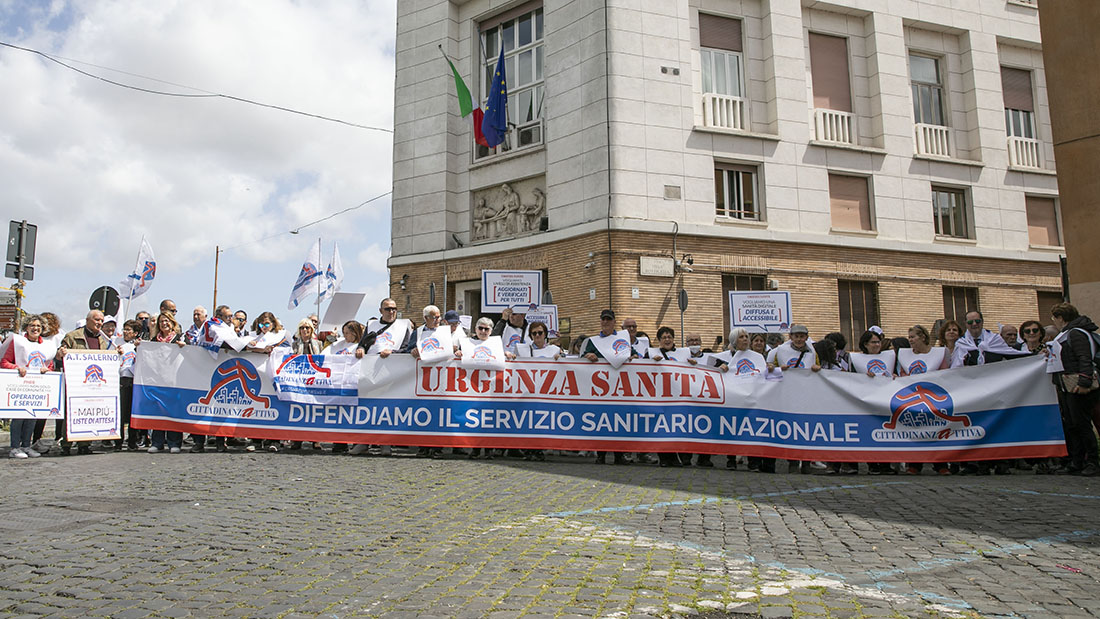
As citizens, stakeholder and users of our National Health Service, we are very concerned about the deafening silence of the Ministry of Health and the Ministry of Economy, after the presentation of the XVI PiT Health Report of the Tribunal for Patients' Rights-Cittadinanzattiva entitled "Less health care for all, the creeping reform", presented on 16 July in Rome.
As citizens, how should we interpret this silence? Does it confirm that we have "hit the mark" and this is the real political design, that of a creeping reform? Yet the picture that emerges from the Report of the NHS is alarming: the Health Service is increasingly inaccessible to the public, discharge on the pockets of the latter the cost of care, for the lucky ones who can afford it; to the others, however, no choice but to give it up or postponing the time.
As "shareholders" of the NHS we have the right to know who "administer" (for them should be a duty) whether and what actions, and with what timing mode, it will be put in place to overcome the critical issues that citizens encounter in access to health services, as well as for the protection of the NHS.
In other words, we believe that the “accountability” is a duty, especially considering the importance of the constitutional right to health should ensure that the same SSN.
How should interpret the absence of the Minister of Health, or his delegate, the many volunteers who daily protect the right to health? And more importantly, what message does the Minister provide to the many citizens who find themselves in these reports because of these situations they live, or those people who have been referred to the Tribunal for Patients' Rights to protect their rights? Yet some officials of the Ministry were present, mixed in the audience, attentive, listening, and with them many professionals, citizens, representatives of patient associations.
Instead, health professionals did not withdrawn from the comparison, administrators, doctors, nurses, pharmacists, trade unions, to give just a few examples.
We cannot hide to be worried by this lack: it is the first time in the history of our organization that the Minister of Health does not participate in this event. We hope to soon be denied by a concrete act: a call to discuss it with the Minister and the opening to dialogue, comparison and sharing with citizens' associations and patients.
Turning however to the substance of the matter, those who say that we need to rethink the concept of universalism (ensuring everything to everyone), we say that what has already been achieved in practice through a "non-formal" reform, on which neither the citizens nor the health operators and all the other actors were invited to speak their opinion: pretty much a real "creeping" reform.
We are facing a health service more and more "inaccessible", which decides who to heal using the chronological order (cannot get sick at year end, ie "first come first served") and territorial (in the center-south the Ministry of health tells us that the LEA are not guaranteed and levels of ticket and super rates are much higher than elsewhere in Italy). A "selection" in fact realized through disinvestment of the National Health Fund unprecedented, amounting to over € 30 billion in the 2012-2015 period and with retroactive effect, however, with all that this entails.
For the first time in the history of the financing of the FSN in 2013-2014 is lower in absolute terms than that of 2012.
A disinvestment "funded" directly with the money of citizens forced to bear the increasing costs or care to give it up, and replaced by its support of the families, a main pillar of the welfare system, in respect of which the state has implemented a real and proper "care proxy".
A linear disinvestment that weighs negatively on the rights of citizens, in reality, not virtuous, without affecting waste, inefficiency and corruption.
A reform that has a negative impact also on the same Public System, which could not hold more competition with the private sector, in particular the low cost, which really benefits from this creeping operation.
The economic objective of "balanced budget", recently introduced in our Constitution, has dominated the main objective to which is that the NHS should aim to produce health in its broadest sense. It is essential, now more than ever, given the economic and employment crisis and in order to guarantee "social cohesion" of the country, to rebalance the bar between the two forces - economic equilibrium versus rights - which today appear clearly and conflict lean towards the first.
It is clear that this first involves a "political" choice that mackerel from the idea of the unsustainability of our NHS (in fact, it produces more than 11% of GDP and absorbs only 7.1%) and instead agree in supporting it appropriately compared to the real needs.
However, what is still missing and that is hard to start is a real reform / reorganization of our National Health Service to protect the right to health of citizens and also benefits the coffers of the same.
A reform of the "system" for the right to health and for the defense of the Public Health Service, which, starting from programming, for example, put firmly at its core:
- Stop further cuts to the National Health Fund
- Update the Essential Levels of Assistance (LEA) implementing the provisions of article 5 of the Decree Balduzzi: review lists of chronic and rare exempt, revision of Tariff Nomenclature Arthroplasty;
- Act in a systematic way to govern the waiting lists, starting from:
- Updating the Plan of Government of waiting lists expired for more than one year
- Management of agendas for hospital admissions more transparent, promoting networking and centralization of information about;
- Transparency and consultability for all citizens of the real waiting times (and not just the maximum time) for visits, examinations, hospitalizations and day surgery by highlighting them on their website, in a special section called "waiting lists" (extensive application of the decree 33/13);
- Anticipating the discretionary policy only within a rigid frame of certified skills, not only in the appointment of General Managers of ASL but enlarged to managers of agencies and public bodies that deal with health care, however.
- Involving Organizations of citizens and patients, shareholders and users of the NHS: for the approval of the New Covenant for Health that will track the health for the coming years and the eventual process of reform of the system of ticket.
Tonino Aceti, national coordinator of the Tribunal for Patients' Rights-Cittadinanzattiva












